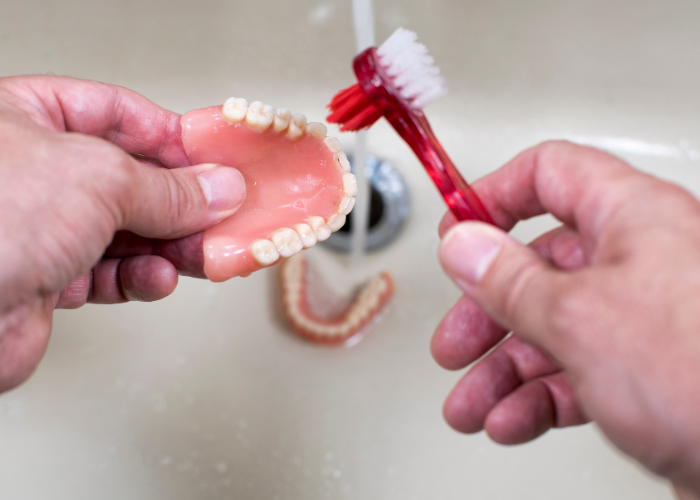Denture Care in Care Homes: Best Practices for Hygiene and Dignity
Updated June 2025
Good oral health is essential to a person’s overall well-being, especially in later life. Yet, denture care in care homes is often overlooked or inconsistently managed. Without proper attention, dentures can become a source of discomfort, infection, or even social withdrawal. In this guide, we’ll walk you through best practices for denture care in care homes, with a focus on hygiene, comfort, and preserving dignity.
Why Denture Care in Care Homes Is So Important
Let’s begin with why this topic matters. Many residents in care homes wear full or partial dentures, and their ability to maintain these independently may decline with age or illness. If dentures are not cleaned or stored correctly, several issues can arise:
- Oral infections, such as thrush
- Unpleasant odours and tastes, affecting appetite
- Gum irritation and mouth ulcers
- Loss or damage to expensive dental appliances
- Reduced self-esteem due to embarrassment or discomfort
Fortunately, with a few simple routines, denture care in care homes can be safe, consistent, and respectful.
Daily Denture Cleaning: A Must-Do Task
To prevent bacterial build-up, dentures should be cleaned every day. Ideally, staff should support or prompt this as part of the morning and evening personal care routine.
Here’s a recommended step-by-step process:
- Rinse after meals: If possible, encourage residents to rinse dentures with water to remove food particles.
- Brush gently: Use a soft-bristled denture brush and non-abrasive cleaner. Avoid standard toothpaste—it can scratch the surface.
- Rinse thoroughly after cleaning to remove any residue.
- Clean the mouth too: Even if the resident has no natural teeth, gently clean gums, tongue, and the roof of the mouth.
If assistance is required, always explain each step to the resident. This maintains both trust and comfort.
Safe Storage: Avoiding Damage and Contamination
When dentures are not being worn—such as overnight—they should be stored safely. This prevents them from drying out, becoming damaged, or getting lost.
Use a clearly labelled, ventilated pot like the polypropylene denture pot with liner and lid. This helps:
- Keep dentures moist, reducing warping
- Prevent cross-contamination between residents
- Protect against accidental disposal or breakage
- Provide a discreet, hygienic container for bedside storage
Always encourage residents to store their own dentures in the same place, creating a reliable routine.
Supporting Residents with Dementia or Limited Mobility
Residents with dementia, arthritis, or reduced dexterity may not be able to manage their dentures independently. In such cases, carers play a vital role in providing both physical support and reassurance.
To help:
- Offer visual cues and prompts for the cleaning process
- Use calm, step-by-step instructions
- Maintain eye-level contact and gentle encouragement
- Use familiar cleaning products to reduce distress
If dentures become painful or don’t seem to fit well, notify a dental professional. Over time, the shape of the mouth can change, requiring adjustments or replacements.
Common Mistakes to Avoid
Even with the best intentions, there are some common pitfalls to watch for:
- Using hot water: This can warp dentures—always use lukewarm water.
- Skipping storage routines: Leaving dentures out to dry damages their structure.
- Using harsh cleaning agents: Bleach or regular toothpaste can be too abrasive.
- Assuming dentures don’t need cleaning: Bacteria builds up quickly, even if not visibly so.
Avoiding these mistakes ensures better comfort, fewer infections, and a higher standard of care.
Staff Training and Record Keeping
Consistency is key in a care home environment. Therefore, include denture care as part of staff induction and ongoing training. A few simple actions help embed best practice:
- Add denture care to daily care plans and charts
- Keep a record of denture condition and complaints
- Encourage regular dental check-ups, even for residents with full dentures
- Share good practices during team meetings or handovers
This not only protects residents—it helps staff feel confident and supported in their role.
Family Involvement and Communication
Don’t forget to involve families in discussions about denture care in care homes. Some families may assume their loved one’s dentures are being fully managed, when in reality the resident may need assistance.
Communicate clearly about:
- The daily routine and who is responsible
- Any recent issues, such as lost or broken dentures
- Whether a dental review is needed
Families often appreciate knowing their loved one’s dignity and comfort are being protected, especially around something as personal as oral hygiene.
Where to Get Support and Supplies
To maintain high standards of denture care, the right tools make all the difference. For hygienic and clearly labelled denture storage, we recommend the denture pot with lid and liner. It’s practical, safe, and discreet—ideal for use in shared or private care home environments.
Need further guidance or a bulk supply of denture care products? We’re here to help. Contact us today via the Able contact form for advice, product enquiries, or to discuss training options.
In Summary: Denture Care in Care Homes Done Right
Let’s recap the essentials of proper denture care in care homes:
- Clean dentures daily with a soft brush and suitable cleaner
- Store safely using labelled, ventilated pots
- Support residents with dementia or reduced ability
- Train staff and keep accurate care records
- Communicate openly with families
- Use quality products designed for hygiene and dignity
Denture care isn’t just about cleanliness—it’s about confidence, comfort, and respect. When managed well, it contributes to overall wellbeing and helps every resident feel like themselves.


